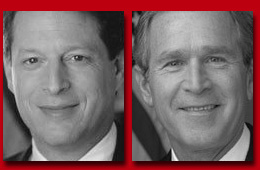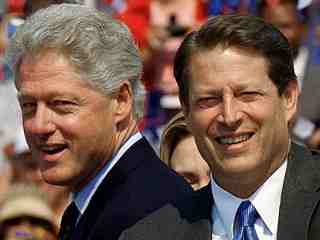Despite being considered irrelevant by both parties at the onset of the 2000 Presidential election, Nader ascended to a position of the so called "spoiler," after his campaign for chief executive gathered an impressive 2.74% of the popular votes. Since the man's campaign received such a large number of its ballots from the State of Florida, Democratic strategists have since contended that his presence on the voting papers cost Vice President Al Gore the general election.
I feel this is unfair on many accounts, and simply surmises to a juvenile sore loser attitude from the DNC, which could not even take the presidency from George W. Bush in 2004, despite their tremendous advantage, and Nader's far lesser portion of the votes. These can briefly be covered by including Gore's weak campaign, the presidential debates commission, and Nader's own message for the year 2000.
Perhaps in an admirable attempt to avoid the "no clear definition" characteristic given to former President George H.W. Bush after the Republican's copying of Ronald Reagan's image to win in 1988, Al Gore distanced himself, rather disastrously, from Bill Clinton's administration of America. Considering the Arkansas Democrat's tendency to present a record of messy and unsettling personal relationships, as well as the South's aversion to such public behavior, this might actually be viewed as wise, accept for the fact that the Vice President's alternative was nothing short of weak and ineffective.
And so Al Gore became the paladin for environmental protection in the United States, leaving behind the strongest issue for his candidacy in that year: the 3 trillion dollar surplus left by Bill Clinton. The merits of the money reserves can be debated, but no matter what is said, it made a terrific ploy for a strong and difficult to beat campaign. Instead, Donna Brazile, Gore's manager, allowed him to pursue a reckless and shoddy plan which was doomed to fail against the charismatic pro-tax cuts Texas governor, George W. Bush. Fused together, the following ad reveals just how out of touch Gore's message felt to a public in which less than 10% today feel protecting the planet is an important issue (Gallup Poll).
As the election came around to presidential debates, little action was taken by the Democratic Party to help include Mr. Nader, despite his insurgent strength in choice polls and in battleground states. Not surprisingly, the commission for debates, controlled by both former party chairs of the two major electoral factions and a large number of corporations, refused to allow Ralph Nader to attend any of their three sessions, and even went as far as to deny him a seat despite his registered invitation and ticket for attendance. According to commission rules, candidates must poll at least 5% in several national questionnaires before being admitted, and Nader did not qualify with enough support. In minced terms, he was not relevant to the equation--accept that he became very relevant as soon as his movement hurt the Democrats.
Ever since Al Gore conceded the race to George W. Bush, the Democratic Party has attempted to slander the man for his hopeful candidacy, absolutely avoiding how his message drew members of all parties and ideologies to cast their ballots for him in 2000. As noted before, Nader's views can seem ridiculous at some corners, yet his message for the turn of the century was to forge a strong alliance between the people and honest businesspeople in America. The Democrats failed to deliver their historical populist message, and neglected to use the strongest element of advantage: the Clinton surplus. What should have been an easy victory turned into a milestone of defeat as the party scrambled to realign, and failed again, in 2004.
Ralph Nader may never become president, nor should anyone hope he does, yet the man deserves our respect and consideration. Standing firm against two of the largest and most powerful parties in the United States is not cakewalk; it requires tenacity and an iron resilience against the opposition. For all his work, Ralph Nader has seen even his closest friends betray him for the Democratic Party, yet a stronger force is allied with him: countless Americans who desire fundamental change in the system of government.
David Marino
National Alliance Vice President for Campaigns



No comments:
Post a Comment